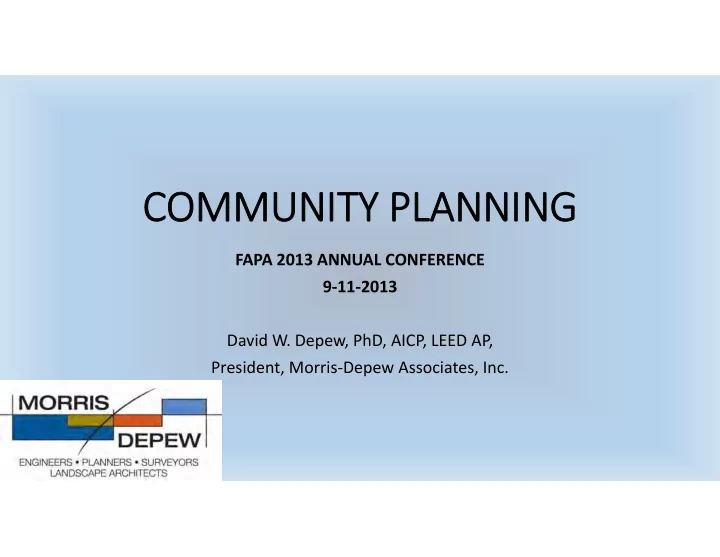

COMMUNI OMMUNITY TY PLANNI ANNING NG FAPA 2013 ANNUAL CONFERENCE 9 ‐ 11 ‐ 2013 David W. Depew, PhD, AICP, LEED AP, President, Morris ‐ Depew Associates, Inc.
Communi Community Gr Groups oups – S – Small Gr Group oup Beha Behavi vior or “In small groups there may very well be some voluntary action in support of the common purposes of the individuals in the group, but in most cases this action will cease before it reaches the optimal level for the members of the group as a whole. In the sharing of the costs of efforts to achieve a common goal in small groups, there is however a surprising tendency for the "exploitation" of the great by the small.” Mancur Olson, The Logic of Collective Action, p. 3
“ The right to life is the source of all rights—and the right to property is their only implementation. Without property rights, no other rights are possible. Since man has to sustain his life by his own effort, the man who has no right to the product of his effort has no means to sustain his life. The man who produces while others dispose of his product, is a slave.” Ayn Rand, The Virtue of Selfishness, p. 93
What About Everyone Else? “…large or latent groups have no tendency voluntarily to act to further their common interests…For the unorganized groups, the groups that have no lobbies and exert no pressure, are among the largest groups in the nation, and they have some of the most vital common interests…The rational individual in the economic system does not curtail his spending to prevent inflation (or increase it to prevent depression) because he knows, first, that his own efforts would not have a noticeable effect, and second, that he would get the benefits of any price stability that others achieved in any case. For the same two reasons, the rational individual in the large group in a socio ‐ political context will not be willing to make any sacrifices to achieve the objectives he shares with others.” Mancur Olson, The Logic of Collective Action, p. 165
Ethics & Community “Our primary obligation is to serve the public interest and we, therefore, owe our allegiance to a conscientiously attained concept of the public interest that is formulated through continuous and open debate.”
Ethics & Community “To comply with our obligation to the public, we aspire to the following principles: a) We shall always be conscious of the rights of others . b) We shall have special concern for the long ‐ range consequences of present actions . c) We shall pay special attention to the interrelatedness of decisions . d) We shall provide timely, adequate, clear, and accurate information on planning issues to all affected persons and to governmental decision makers. e) We shall give people the opportunity to have a meaningful impact on the development of plans and programs that may affect them. Participation should be broad enough to include those who lack formal organization or influence. f) We shall seek social justice by working to expand choice and opportunity for all persons, recognizing a special responsibility to plan for the needs of the disadvantaged and to promote racial and economic integration. We shall urge the alteration of policies, institutions, and decisions that oppose such needs. g) We shall promote excellence of design and endeavor to conserve and preserve the integrity and heritage of the natural and built environment. h) We shall deal fairly with all participants in the planning process . Those of us who are public officials or employees shall also deal evenhandedly with all planning process participants .”
Affirmatively Furthering Fair Housing • 78 ‐ FR ‐ 43709 • “c. Incorporating, explicitly, fair housing planning into existi9ng planning processes…into housing, community development, land ‐ use, and other decision making that influences how communities and regions grow and develop.” • Robert P. Astorno, former Chief Administrator, Westchester County, NY • “the agency wants the power to dismantle local zoning so communities have what it considers the right mix of economic, racial and ethnic diversity. A finding of discriminatory behavior, or allegations of discrimination, would no longer be necessary. HUD will supply ‘national uniform data’ of what it thinks 1200 communities should look like.”
Recommend
More recommend